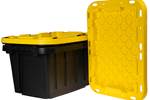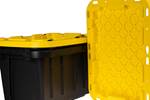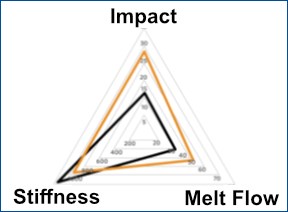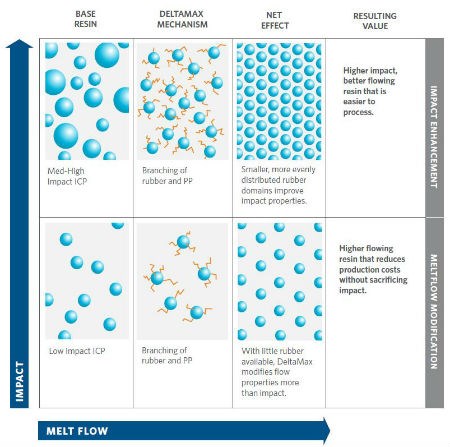Performance Modifier Additives Make Standard Polypropylene Resins Perform Like Premium Grades
Sponsored ContentPolypropylene (PP) shortages have forced many processors to move to lower grade resins at the cost of lower performance and processability. Milliken’s DeltaMax Performance Modifiers upgrade these materials to enhance impact resistance, melt flow rates, and sustainability through the use of more recycled material.
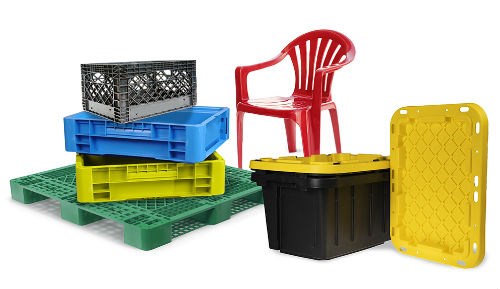
COVID-19 has disrupted virtually all businesses, but one of the larger impacts has been the roller coaster effect on material prices for plastics processors. As demand fell initially, prices plunged, but increasing demand this summer for housewares and durable goods combined with supply chain disruptions due to weather events in the US drove prices well above norms for some resins. In addition, the global demand for various PPE, including masks and hospital gowns, led to a shift in availability for traditional copolymer PP grades which created serious supply shortages.
The shortages and high prices of PP have forced many processors to substitute lower grades of PP to get by, but that comes at the cost of diminished physical properties and poor melt flow performance which increases processing costs and can cause quality problems.
Milliken’s online app shows how much DeltaMax will improve the impact and melt flow properties of your existing ICP and recycled PP resins.
Fortunately, a family of additives is available that removes the compromise by improving both the physical properties and the processability of copolymer polypropylene so that it can serve more demanding applications yet still reduce processing costs. That’s what Milliken is offering with its DeltaMax™ family of masterbatch performance modifiers. The technology enables injection molders to enhance the impact and melt flow of their ICP or rPP resins by adding a masterbatch at machine-side. The net effect is the ability to produce parts with higher impact resistance and thinner profiles, run machines with faster cycle times and lower temperatures, reduce the use of costly impact modifiers, and reduce inventory of multiple ICP resins.
Additionally, DeltaMax performance modifiers allow for the use of recycled PP at equal or better performance levels compared to virgin resins. This creates an opportunity to improve the circular economy and promotes more sustainable manufacturing practices.
Moreover, PP generally has a low carbon footprint, and use of greater amounts of rPP is important to many processors’ sustainability initiatives. But using recycled PP has typically come at the price of poor processability and increased part defects, including flashing, sink marks and most common, short shots. Some processors compensate by running at higher temperatures to improve melt flow and fill out their molds. That too has a cost by leading to degradation of the plastic with substantial loss in impact properties. It also increases energy use and creates more wear and tear on the equipment. DeltaMax mitigates these compromises by improving processability at lower temperatures, resulting in higher quality products in a more cost effective and sustainable environment.
Proven Performance
There are a number of documented case studies where DeltaMax has rendered dramatic improvements to injection molded products. Here are three good examples:

Polypropylene septic chamber component.
Increase Sustainability with More Recycled Resin — A polypropylene septic chamber manufacturer wanted to incorporate more post-consumer recycled content into their current rPP resin formulation to help to meet their corporate sustainability goals. But they knew that poor melt flow associated with post-consumer recycled materials can lead to the creation of brittle parts, manufacturing defects and loss in productivity through longer cycle times. Using DeltaMax m100 Melt Flow Modifier at 1.5% LDR enabled the processor to boost melt flow properties of the PCR polypropylene to equal to or better than existing resin formulations while maintaining product specifications and operational efficiencies. More
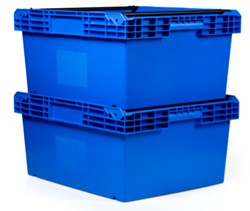
Polypropylene material handling containers.
Increase Production Output — A manufacturer of material handling containers was attempting to improve the output of their injection molding machines. While the company was investing in new presses, they still were fighting with capacity restraints. They considered the use of resins with better melt flow characteristics for faster processing, but the physical performance was not acceptable and the cold temperature impact properties fell below an acceptable range. Using DeltaMax a200 at 1.0% LDR enabled a cycle time reduction of 20%, resulting in an estimated annual throughput increase of 110,000 containers. Productivity improvements and energy savings yielded an additional 58 days of production which resulted in $2 million in additional revenue at 20% margin. More
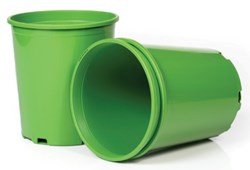
Polypropylene horticultural containers.
Increase Throughput and Reduce Costs — A horticultural container manufacturer was attempting to increase throughput and reduce processing costs of their 2.65 gallon flower pots, but parts would become defective because higher melt flow resins produce brittle parts that break easily. Conversely, lower melt flow resins could lead to product defects, such as short shots and inconsistent parts. Using DeltaMax m100 Melt Flow Modifier at 0.5% loading allowed the company to reduce processing temperatures by 14%, resulting in shorter cooling times and a cycle time reduction of 13%. Throughput improvements of 415,000 pots resulted in $275,000 of additional revenue with significant margin improvement. More
These are but a few examples of how DeltaMax has changed the economics of processing polypropylene. It enables stronger and stiffer end products, lower processing and material costs, and more sustainable manufacturing practices. That’s a package of benefits PP injection molders can’t afford to ignore.
How it Works
Described as a novel reactive extrusion modifier, DeltaMax is a radical advancement in additive technology for PP impact copolymers (ICPs) as well as recycled PP. The problem with polypropylene has been that it doesn’t provide a good balance between high impact resistance with stiffness and melt flow, making it difficult to cost-effectively formulate, design, and process higher functioning parts. This is particularly the case for recycled polypropylene resins, which typically lack high melt flow and impact properties required for many injection molded applications within consumer, industrial, and automotive markets.
What DeltaMax does is to mitigate those limitations with substantially improved melt flow, higher impact parts, and often both. What’s most important for the application will determine which grade of DeltaMax to use.
The additive increases impact strength by as much as three times by optimizing rubber dispersion and domain size (see graphic). This higher impact performance allows processors to decrease rubber content to reduce weight and costs. If a low impact ICP (with low rubber content) is suitable for the application, for example, DeltaMax can increase the melt flow rate as much as five times without sacrificing impact resistance. The material now becomes much easier and less expensive to process. With a medium- to high-impact PP grades, the additive converts the rubber to smaller, more evenly distributed domains to improve impact properties, yet still is easier to process. There are many other applications where processors are looking to improve both properties, and there is a DeltaMax additive for that too. More on this later.
The DeltaMax Value Proposition
By simultaneously improving both impact and melt flow in PP impact copolymers, DeltaMax enables processors to make parts stronger, lighter and faster than before. The technology results in three major cost benefits:
Cycle Time Reduction — Decreasing resin viscosity speeds first stage injection for quicker filling of the mold. With higher melt flow, processing temperatures can also be reduced which decreases cooling time in the mold. The combination of faster fill and quicker injection results in an average productivity improvement of 10%. It also means you can produce more parts with less energy.
See how DeltaMax reduces cost by improving melt flow.
Resin Consolidation — Custom processors use a variety of PP grades for different products. Low cost resins are fine for simple parts, but a more expensive premium grade will be required for parts with better physical properties. With DeltaMax the properties of the less expensive resin can be upgraded to match the premium resin. This reduces the number of polypropylene grades a processor needs to purchase and store. Using fewer, and lower cost resins lowers total material costs.
DeltaMax enables injection molders to make more products with fewer resins.
More Recycled PP — Recycled PP is inexpensive, but its physical properties and processability are poor which is why it generally can only be used in combination with a larger ratio of virgin resin. DeltaMax boosts the properties of recycled PP making it equal to or even better than virgin resin. That means processors no longer have to blend multiple resins to get the necessary part properties. Processors can even make parts with 100% recycled PP resins. This ability further reduces costs while achieving a level of sustainability that was not possible before.
DeltaMax enables much greater use of recycled PP resins.
DeltaMax Grades
How effective is DeltaMax? As the graphs below show, this additive offers multidimensional improvements to PP performance and processability. There are three grades of DeltaMax masterbatches designed to primarily target impact enhancement, melt flow improvement, or both. They are:
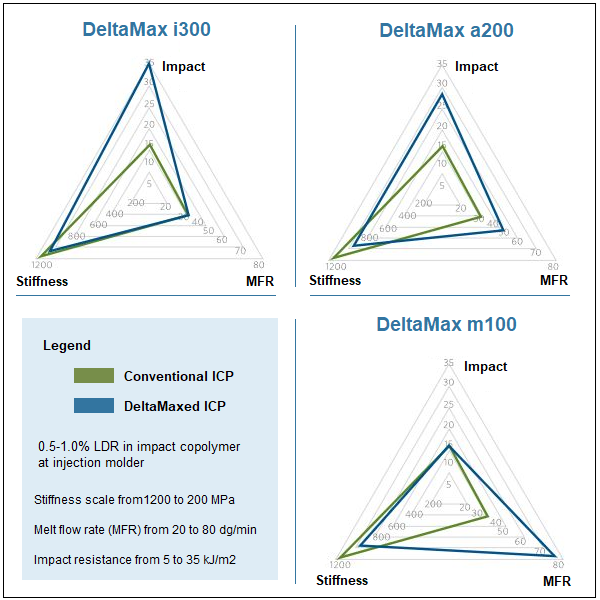
DeltaMax i300 Impact Enhancer — Maximizes impact performance while optimizing melt flow rate.
DeltaMax a200 All Purpose Modifier — Provides a strong balance of impact, stiffness, and melt flow rate.
DeltaMax m100 Melt Flow Modifier — Increases the melt flow rate while providing equal or better impact performance.
Go here for more information on DeltaMax performance modifiers for polypropylene or download brochure now.
